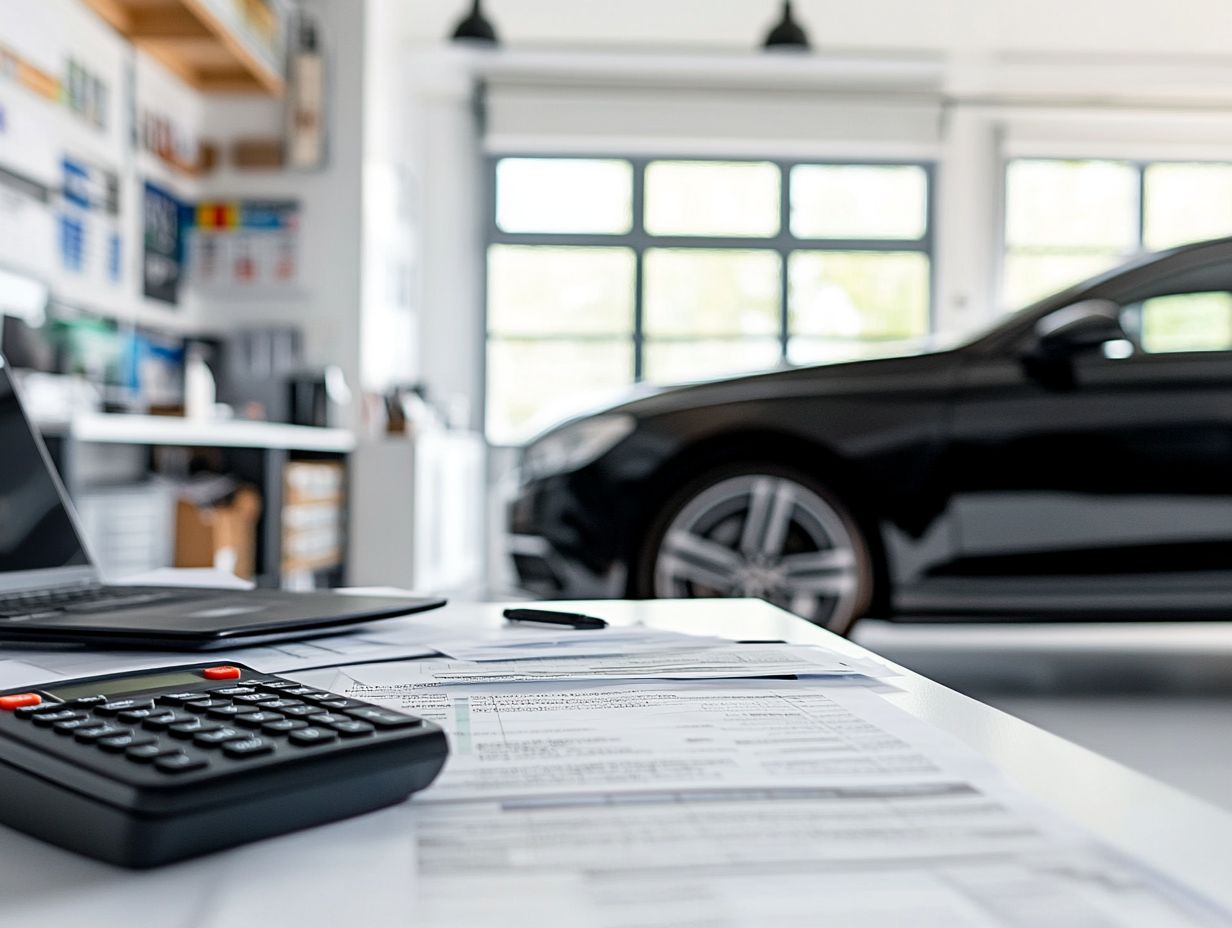What Makes a Car an Investment?
Investing in a car may not immediately spring to mind when you think of financial strategies, yet it can be a clever move if approached thoughtfully.
This article delves into what constitutes an investment, explores the reasons why certain cars can appreciate in value, and identifies the factors that contribute to this phenomenon. It also considers potential risks, outlines essential factors to ponder before making a purchase, and offers tips to enhance your car s value over time.
Whether you re a passionate car aficionado or simply curious, you ll uncover insights that could transform your perspective on automotive investments.
Contents
Key Takeaways:

- Understanding investment helps determine if a car is a viable choice.
- Factors like rarity and demand can influence a car’s investment potential.
- It’s vital to consider market trends and personal tastes before you invest.
The Definition of an Investment
An investment is essentially an asset or item you acquire with the intention of generating income or increasing in value over time. It embodies a strategic approach to building wealth. Whether in the form of stocks, real estate, or even collectible vehicles, investments are important in personal finance.
Certain assets possess unique characteristics that can enhance their financial advantages significantly. Take the car collecting sector, for example classic cars often take the spotlight due to their potential for substantial appreciation, rarity in production, and distinctive features, making them highly sought after by both enthusiasts and savvy investors.
Understanding the Concept
Understanding the concept of investment is essential, as it involves allocating your resources be it time, money, or effort with the expectation of earning a profit or reaping financial rewards over time.
Investment can manifest in various forms, including stocks, bonds, real estate, and even collectibles, each offering unique opportunities and potential returns. For example, while stocks might present higher appreciation potential, they also come with a level of volatility and risk that could make some investors think twice. On the flip side, real estate is often viewed as a more stable option for appreciation, providing a tangible asset that can generate passive income through rentals.
Assess your risk tolerance and investment horizon. Each investment vehicle has unique characteristics that can affect performance and return on investment.
Why Cars Can Be Considered Investments
Cars can indeed be seen as viable investments, especially when you consider their potential for appreciation, particularly in the collector car market. Certain models, like the McLaren F1, Chevrolet Corvette, and various vintage cars, have shown remarkable investment value over time.
This exciting sector is attracting both seasoned collectors and new investors who understand that factors like rarity, historical significance, and condition can substantially impact auction prices and overall returns.
Understanding model popularity and limited production runs helps you make informed choices in the classic car investment landscape.
Factors That Increase Car Value
Several factors can significantly elevate a car’s value, such as rarity, historical significance, and impeccable condition, making them highly sought-after treasures for collectors and investors alike.
Recognizing how scarcity drives up demand can boost your investment strategy; limited-edition models often command premium prices that reflect their desirability.
Meticulous upkeep through regular maintenance and restoration can substantially enhance a vehicle’s overall appeal and longevity, ensuring it remains a prized possession for years to come.
Evaluating depreciation rates is also crucial; depreciation refers to the loss of value over time. Certain cars, especially those with a rich history, may appreciate instead of losing value.
Enthusiasts often employ investment strategies targeting specific brands or models known for stable returns. This ensures that their collection not only sparks joy but also serves as a sound financial venture.
Potential Risks and Drawbacks

While the allure of investing in classic cars is undeniably captivating, it is essential to consider the potential risks and drawbacks. Depreciation rates can significantly impact market value, and high maintenance costs may eat into your profits. Securing adequate collector car insurance, which protects your valuable cars, is crucial to safeguard your assets.
Depreciation and Maintenance Costs
Depreciation rates can significantly affect the value of your vehicle over time, especially if it is not a classic or rare model. Maintenance costs can accumulate quickly, so it is vital to factor these into your investment calculations.
Unlike standard vehicles that typically lose value at a consistent rate, classic cars can either appreciate or depreciate based on factors like rarity, historical significance, and overall condition. This creates a distinctive landscape where well-maintained classics might actually increase in value, even as the years go by.
Furthermore, maintenance costs for vintage models tend to be higher due to the need for specialized parts and skilled labor. These considerations highlight the importance of collector car insurance, which provides financial protection and offers peace of mind, ensuring that your unique investments are shielded from unforeseen circumstances.
Factors to Consider Before Investing in a Car
Before you invest in a car, several crucial factors need consideration. Market trends, personal preferences, and the overall demand for specific models play significant roles.
These elements can drastically influence your investment strategies and potential returns, making it essential to approach your decision thoughtfully.
Market Trends and Demand
Market trends are crucial in shaping the demand for specific vehicles and significantly influence how you approach your investment strategies within the collector car market.
As new preferences emerge think eco-conscious choices that lean toward electric and hybrid models it is essential to remain vigilant about shifts in consumer sentiment. For example, classic muscle cars are experiencing a revival, fueled by nostalgia and a desire for rarity.
This dynamic landscape requires you to act now to diversify your portfolio and seize the best opportunities while keeping a keen eye on historical data. By doing so, you position yourself to capitalize on the rising values of coveted models, ensuring your strategies align with current trends for profitable outcomes.
Personal Preferences and Needs
Personal preferences and needs play a pivotal role in shaping your investment choices in the collector car market, as these decisions often mirror your individual tastes and lifestyle considerations.
Take, for instance, your passion for vintage models. If you are a car enthusiast drawn to classic Ferraris or Mustangs, you might prioritize these investments not just as a savvy financial strategy but as a way to satisfy a deep emotional connection.
Aligning your passions with your investment choices can lead to exciting opportunities! This alignment influences both the satisfaction you derive from ownership and the long-term value potential of your assets. Therefore, understanding your goals whether you aim to diversify your portfolio, gain access to exclusive car shows, or curate a personal sanctuary of cherished automobiles will ultimately guide you toward choices that resonate profoundly with your unique identity and financial objectives.
How to Maximize the Investment Value of Your Car

Maximizing the investment value of your car requires careful upkeep and thoughtful selling strategies. By doing so, you ensure that your vehicle not only appreciates but also retains its value over time, especially in the competitive landscape of the collector car market.
Explore your options today!
Maintaining and Upgrading Your Car
Regular maintenance and thoughtful upgrades can truly elevate your car’s investment value, making it more appealing to potential buyers in the collector car market.
By consistently scheduling service checks, you not only ensure your vehicle runs smoothly but also create a detailed service record that serves as a compelling selling point.
When selecting enhancements whether performance upgrades or aesthetic improvements it’s essential to align with current trends while preserving originality. Striking this balance will undoubtedly attract the attention of enthusiasts.
Simple actions like regular oil changes, tire rotations, and regular engine checks can greatly enhance your vehicle’s longevity.
Maintaining a detailed service record shows your commitment to quality, positioning your car as a worthy investment in the eyes of future buyers.
Selling Strategies for Maximum Profit
Implementing effective selling strategies is essential for maximizing profit when you decide to sell collectible cars, particularly during periods when auction predictions favor certain classic cars.
Quickly grasping classic car market trends can turn your sale into a success! You need to keep a vigilant eye on trends and timing to ensure your vehicles reach the right audience.
By conducting thorough market analysis, you can pinpoint peak seasons and ideal selling conditions that resonate with buyer interest.
Tapping into data from past auctions will offer valuable insights into pricing strategies and expected returns.
Ultimately, leveraging these selling strategies not only boosts your profit potential but also keeps the classic car community vibrant and engaged, setting the stage for successful transactions in the future.
Frequently Asked Questions
What Makes a Car an Investment?
A car is considered an investment when it has the potential to provide a return on your initial investment, either through appreciation or generating income.
How can a car appreciate in value?
Cars that are limited edition, rare, or have historical significance can appreciate in value over time, making them a potential investment for car collectors and enthusiasts.
Is buying a new car always a good investment?
Not necessarily. While a new car may hold its value better than a used car, it also depreciates significantly as soon as it is driven off the lot. This means it may not be the best investment in terms of generating a return.
What factors should I consider when buying a car as an investment?
Don’t forget to check its condition; it can make a big difference! Aside from the car’s rarity or significance, you should also consider its maintenance history and market demand for that specific model and make. These can greatly impact its potential for appreciation in value.
Can a car be used as a source of income?
Yes, some people use their cars as a source of income through ride-sharing services, rental platforms, or even by participating in car shows and events. However, this also means the car will be subject to wear and tear, which can affect its value in the long run.
Are there any risks associated with investing in a car?
Yes, as with any investment, there are risks involved. The value of a car can fluctuate depending on market demand and other external factors. It’s important to do thorough research and consult with experts before making a car investment decision.







